Why Even Great Storytellers Need an AI Co-Pilot in 2025
The process of creating a compelling narrative is being fundamentally reshaped. Whether you're a novelist staring down a blank page, a marketer developing a brand story, or a student trying to outline a complex plot, the right ai story writer can be a transformative co-pilot. But with a flood of new tools on the market, finding one that genuinely enhances your craft instead of just producing generic prose is a significant challenge. This guide is designed to cut through the marketing hype and provide a practical resource.
We will move beyond surface-level feature lists to offer a deep-dive analysis of the top 10 platforms available today. For each tool, we will explore specific strengths and weaknesses, assess practical use cases from long-form fiction to concise marketing copy, and provide an honest look at their limitations. The advancements in AI mean that even e-commerce platforms are exploring how to leverage integrating powerful AI models like ChatGPT 4 for enhanced customer experiences. This list will help you find the perfect AI partner to brainstorm fresh ideas, structure complex narratives, and bring your unique stories to life with greater efficiency and creative firepower.
1. TextSpell: The All-in-One AI Writing Suite
TextSpell positions itself as a versatile AI writing assistant rather than a dedicated ai story writer, yet its feature set offers significant value for authors. Its strength lies in its ability to support the entire writing process, from research to refinement. For fiction writers, the "Humanize AI" function is a standout, designed to tackle the common issue of robotic-sounding prose. It refines generated text to inject a more natural, engaging cadence, making it feel less like a machine wrote it.
Another practical feature is "Continue Writing." If you're stuck on a scene or need to expand a plot point, this tool can generate the next few paragraphs while maintaining the established tone and context. This is particularly useful for overcoming writer's block or quickly drafting filler scenes that connect major plot events.
Use Cases and Limitations
- Best For: Writers who need a single tool for multiple tasks, including drafting fiction, researching complex topics (using the AI Homework Helper for subjects like physics or history), and managing promotional content like blog posts or social media updates.
- Pros: The "Humanize AI" feature is a direct solution to a major AI writing pain point. Its generous free plan is great for testing, and multi-language support is a plus for international authors.
- Cons: The free plan's 500-word limit is restrictive for any long-form writing. While versatile, it lacks the deep, narrative-specific tools of a specialized ai story writer like Sudowrite, such as character arc generators or detailed plot beat planners.
Pricing: Offers a free plan with a 500-word limit. Paid plans are available for individuals and teams, providing higher usage limits and advanced features.
Website: TextSpell.com
2. Sudowrite: The Fiction Author's AI Muse
Sudowrite is arguably the most recognized and purpose-built ai story writer on the market, designed from the ground up to serve the unique needs of novelists and short story authors. Its key differentiator is a suite of tools that go beyond simple text generation, focusing instead on the craft of storytelling. The "Story Engine" feature is a prime example, capable of generating a complete, multi-chapter outline from a simple premise, including character summaries, plot points, and thematic elements. This makes it an invaluable partner for the initial planning phase of a novel.
For writers who have an outline but dread the first draft, the "First Draft" tool can take chapter summaries and flesh them out into full-length prose, providing a solid foundation to build upon. Another powerful feature is "Rewrite," which offers multiple revision options. It can rephrase sentences, adjust the tone, expand a scene with more sensory detail, or show, not just tell, a character's emotions. This allows for a granular level of control during the editing process.
Use Cases and Limitations
- Best For: Fiction writers of all genres (from romance to sci-fi) who want a dedicated AI partner for brainstorming, outlining, drafting, and revising their narrative work.
- Pros: Its highly specialized tools are tailored specifically for fiction, making it more effective for storytelling than general-purpose AI writers. The intuitive interface guides authors through the entire creative process, and community plugins add even more niche functionality.
- Cons: The platform can be overwhelming for new users, and its credit-based system can be costly for prolific writers on lower-tier plans. While powerful, the generated prose still requires a human touch to ensure a unique authorial voice.
Pricing: Offers tiered subscription plans (Hobby & Student, Professional, Max) based on word credit usage. A free trial is typically available.
Website: sudowrite.com
3. Jasper AI: The High-Speed Content Engine
Jasper AI, originally known for its marketing prowess, has evolved into a formidable tool for a wide range of writing tasks, including fiction. While not exclusively an ai story writer, its "Boss Mode" feature provides the long-form document editor and command-based control necessary for crafting scenes, developing dialogue, or outlining plot structures. This mode allows writers to give direct instructions like "Write a paragraph about a detective finding a mysterious clue," giving them a high degree of control over the narrative's direction while benefiting from AI speed.

The platform's strength lies in its speed and versatility. With over 50 templates, an author can quickly switch from drafting a chapter to writing a promotional blog post or social media update for their book launch. The integration with Surfer SEO is less relevant for pure fiction but invaluable for author-entrepreneurs building their online presence. This makes Jasper a powerful hybrid tool for writers who also manage their own marketing. For more details on this type of tool, you can explore resources explaining the role of an AI writing assistant.
Use Cases and Limitations
- Best For: Authors and content creators who need to produce high volumes of quality content quickly, from fictional drafts to marketing copy. It's ideal for those who are comfortable guiding the AI with specific commands.
- Pros: "Boss Mode" offers granular control over long-form content generation. Its speed is a major asset for overcoming writer's block, and its versatility across 50+ templates makes it a great all-in-one content solution.
- Cons: Without highly detailed prompts, the output can sometimes feel generic or repetitive. It lacks the specialized, narrative-focused features of dedicated story writing tools, such as character arc planners or beat sheets, and all generated factual information requires verification.
Pricing: Jasper offers tiered subscription plans based on word count and features. There is no free plan, but they typically provide a free trial.
Website: jasper.ai
4. NovelAI: For Dedicated Fiction and Worldbuilding
NovelAI is a highly specialized ai story writer designed from the ground up for creative fiction, making it a favorite among novelists and hobbyists. It uses its own fine-tuned GPT models, which are specifically trained on literature, giving its output a distinctly narrative flavor. Unlike general-purpose tools, NovelAI excels at maintaining long-term story coherence, remembering character details and plot points across thousands of words. Its interface is built around a customizable text editor that allows writers to tweak AI settings, guiding the generation process to better match their personal style.
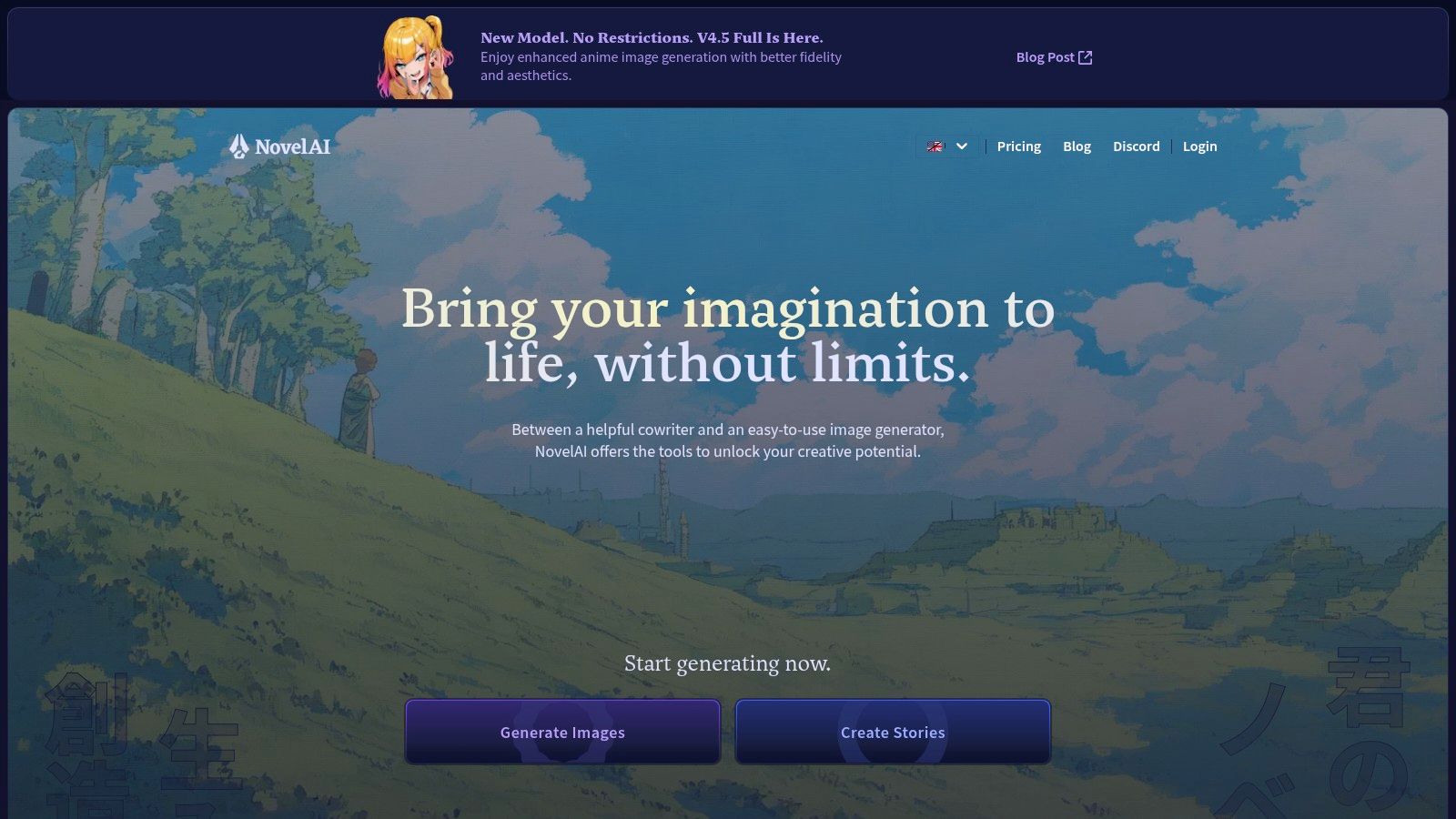
The platform's strength lies in its worldbuilding and character management tools. Users can create detailed "Lorebook" entries for characters, locations, and key concepts. The AI actively references these entries to ensure consistency, which is invaluable for complex fantasy or sci-fi sagas. The "Continue Writing" function, similar to what you might find in other tools, is particularly adept here, as it leverages the Lorebook to produce context-aware continuations. To see how this feature compares with other platforms, you can learn more about AI-powered text continuation tools on textspell.com.
Use Cases and Limitations
- Best For: Long-form fiction authors, particularly in genres like fantasy and sci-fi, who need a dedicated environment for writing, worldbuilding, and maintaining narrative consistency.
- Pros: Models are specifically trained on literature for better narrative quality. Strong data privacy with encrypted servers and a commitment not to train on user stories. Deep customization options for AI behavior and editor interface.
- Cons: The learning curve can be steep for new users trying to master the Lorebook and advanced settings. It requires active guidance and careful prompting to avoid generic prose, making it less of a "one-click" solution.
Pricing: Operates on a subscription model with different tiers offering varying amounts of AI generation credits and memory context. A free trial is often available.
Website: novelai.net
5. Writesonic: The SEO-Savvy Content Creator
Writesonic operates more like a powerful content marketing engine than a dedicated ai story writer, but its underlying technology is highly adaptable for fiction. Powered by advanced models like GPT-4, it excels at generating structured, long-form content quickly. For authors, the "AI Article Writer" can be repurposed to draft entire chapters or extensive backstory lore by providing a simple outline. This makes it a great tool for rapidly fleshing out the first draft of a novel or a series of short stories.
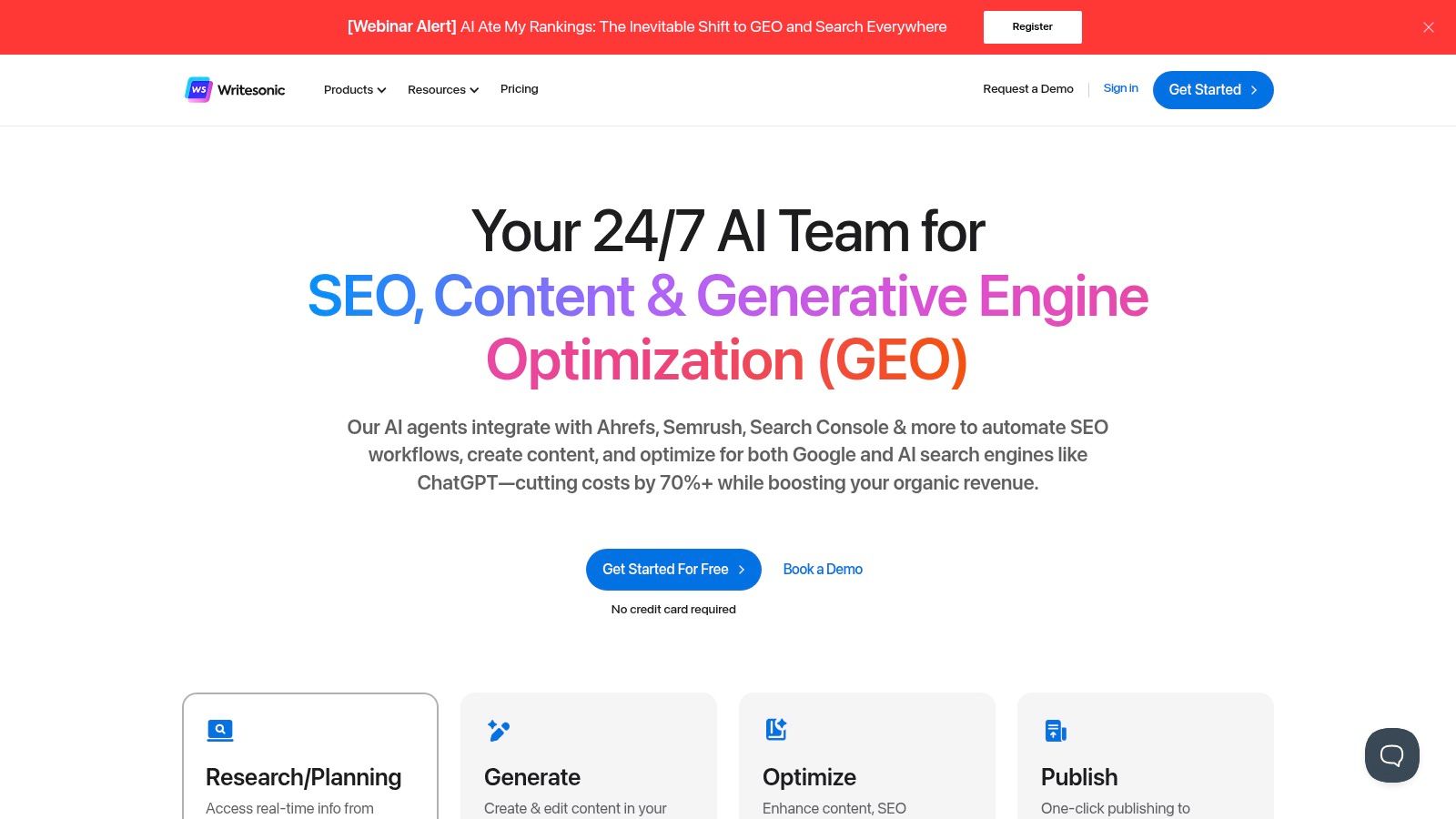
A particularly useful feature for authors building an online presence is the integrated Image Generator, which can create custom visuals for book covers, character concepts, or promotional blog posts. Furthermore, its built-in SEO optimization tools are a major asset for writers looking to publish their work on platforms like Wattpad or a personal blog, helping their stories gain visibility in search results.
Use Cases and Limitations
- Best For: Authors who are also entrepreneurs or marketers, needing a single platform to write their fiction, generate promotional copy, create landing pages for their books, and optimize blog content for search engines.
- Pros: Its versatility is a huge plus, covering everything from fiction drafts to marketing materials. The user-friendly interface makes it accessible for beginners, and the availability of a free tier allows for extensive testing.
- Cons: The output can sometimes feel generic and requires significant editing to inject a unique authorial voice and ensure originality. Core story-focused features are less developed compared to a specialized ai story writer, lacking in-depth character and plot development tools.
Pricing: Offers a free plan with a monthly word credit limit. Paid plans start with Small Business and Enterprise tiers, providing more words, advanced features, and higher-quality generation.
Website: https://writesonic.com/
6. Rytr: The Affordable and Accessible Content Generator
Rytr positions itself as a fast, affordable, and user-friendly AI writing assistant rather than a dedicated ai story writer, but its versatility makes it a valuable asset for authors on a budget. Its core strength lies in its simplicity and broad range of content types. For fiction writers, the "Story Plot" use case is a great starting point for brainstorming outlines or generating initial scene ideas. You can input a simple premise, and Rytr will produce a basic narrative structure to build upon.
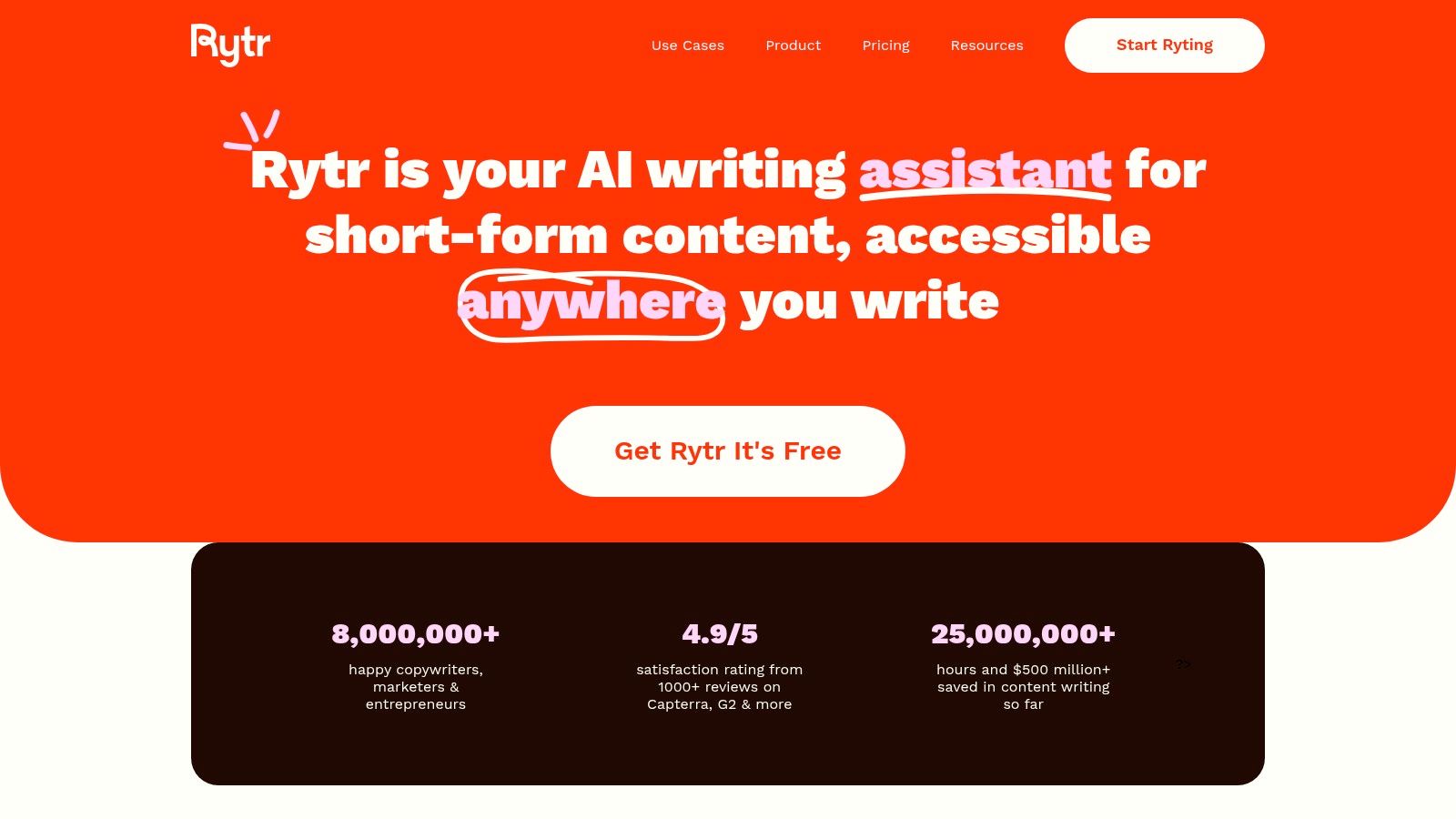
The ability to choose from over 20 tones, from "enthusiastic" to "formal," allows writers to quickly set the mood for a scene or character dialogue. While it doesn't offer the deep narrative control of more specialized tools, Rytr excels at generating short-form content quickly. This is useful for drafting character backstories, world-building snippets, or even promotional content like book descriptions and author bios. Its built-in plagiarism checker also provides an extra layer of confidence.
Use Cases and Limitations
- Best For: Aspiring authors, bloggers, or writers looking for an affordable, all-purpose tool to assist with brainstorming, drafting short scenes, and creating marketing copy for their work.
- Pros: Extremely affordable with a generous free plan. The interface is clean and intuitive, making it easy for beginners to start generating content immediately. Support for over 30 languages is a significant advantage for a global user base.
- Cons: Not optimized for long-form narrative. The output for complex plots or extended prose often requires heavy editing and can feel disjointed. It lacks the advanced, story-centric features like character development or plot beat analysis found in dedicated ai story writer platforms.
Pricing: Offers a free plan that allows you to generate 10,000 characters per month. Paid plans offer higher character limits and access to create your own custom use-cases.
Website: rytr.me
7. KoalaWriter: The SEO-Focused Content Engine
While primarily marketed for SEO content and blog posts, KoalaWriter offers a robust framework that creative writers can adapt for storytelling. Its core strength is its ability to generate structured, long-form content from a simple prompt. For an author, this can be an excellent way to quickly draft a chapter outline or even an entire first draft based on a few key plot points. The tool excels at maintaining grammatical correctness and a consistent style throughout thousands of words, a critical feature for any long-form ai story writer.
The Outline Editor is particularly useful for plotting. You can structure your story into acts or chapters, and then have the AI flesh out each section individually. This gives you a high degree of control over the narrative flow. Furthermore, its direct integration with WordPress and Google Sheets is a unique advantage, allowing writers to easily manage drafts, collaborate with beta readers, or even publish serialized fiction directly to their blog.

Use Cases and Limitations
- Best For: Authors who also manage a web presence, such as a blog or author website, and want a single tool to draft both fiction and promotional SEO content. It's great for quickly generating first drafts from a detailed outline.
- Pros: Affordable pricing makes it accessible. The WordPress and Google Sheets integrations streamline workflow for writers who blog or collaborate. It consistently produces high-quality, readable prose suitable for a first draft.
- Cons: As it's not a dedicated ai story writer, it lacks specific narrative tools like character development or plot arc generators. The AI can sometimes repeat ideas or phrases in very long outputs, and its image generation can be imprecise for specific character or scene descriptions.
Pricing: Offers a variety of subscription plans and pay-as-you-go credits, providing flexibility for different usage levels.
Website: koalawriter.com
8. GrowthBar: The SEO-Focused Content Generator
GrowthBar is primarily an SEO tool designed to create high-ranking blog posts and articles, but its powerful content generation capabilities can be repurposed by authors looking for an ai story writer with a marketing edge. While it lacks narrative-specific features, its core strength is in understanding search intent and crafting content around specific keywords. For authors managing a blog or author platform, this is invaluable for writing posts that attract readers organically through search engines.
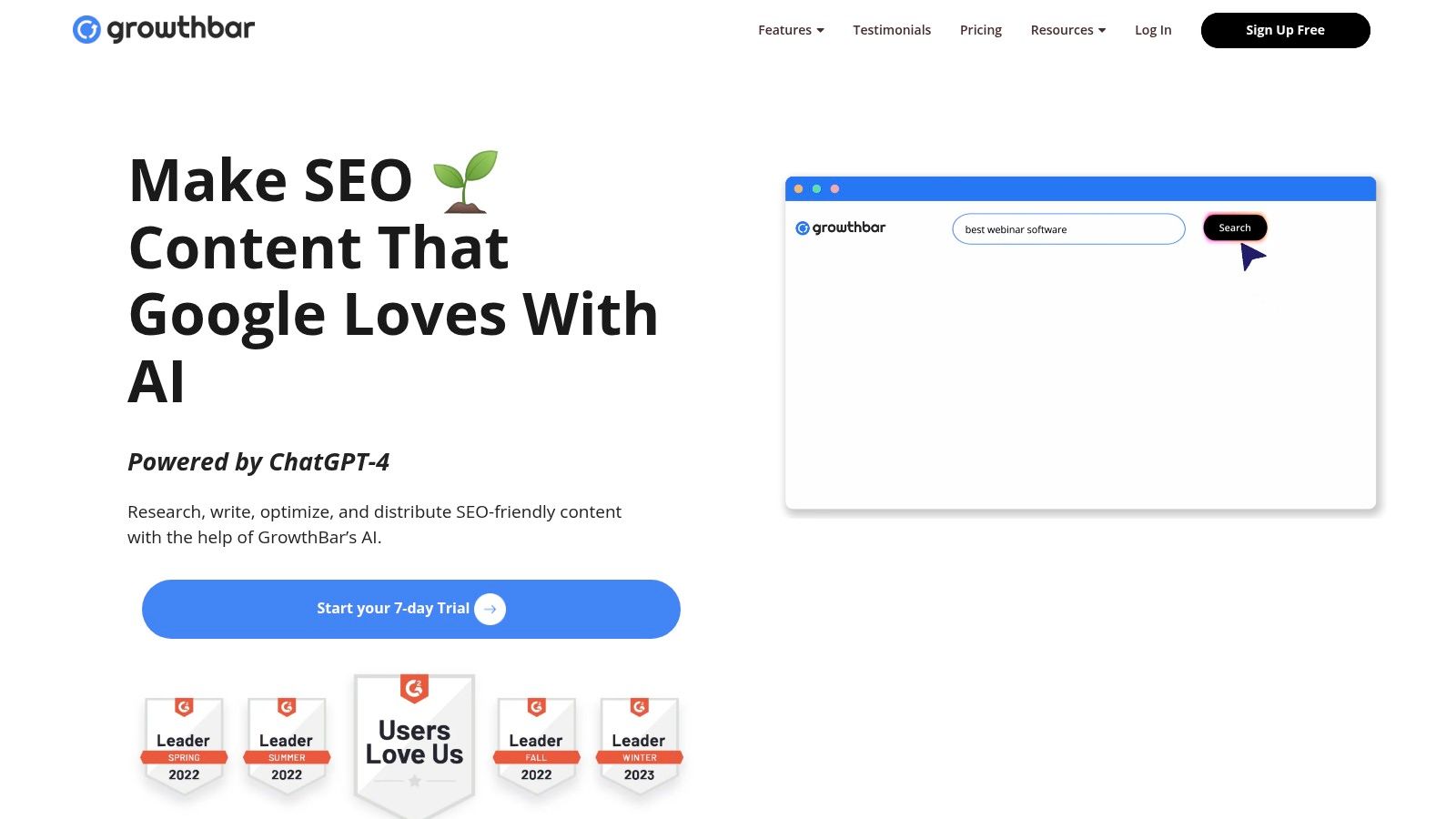
The "AI Blog Writer" can generate a complete, SEO-optimized draft from a single keyword. A fiction writer could use this to create supplementary content, like a "lore deep-dive" or a "character analysis" for their book's universe, ensuring it ranks well and draws in new fans. The Chrome extension is another practical feature, offering real-time keyword insights and competitor data directly within your browser, which is useful for researching themes or tropes that are currently popular with online audiences.
Use Cases and Limitations
- Best For: Authors who are also marketers, managing their own author website, blog, or promotional content. It's ideal for creating content that drives traffic and builds an online platform around their fiction.
- Pros: Excellent for keyword research and creating SEO-friendly content outlines. The user-friendly interface and integrated Chrome extension make it easy to incorporate SEO into your writing workflow without a steep learning curve.
- Cons: The generated content is optimized for search engines, not for creative narrative, and often requires significant editing to sound less formulaic. It is not a substitute for a dedicated story-writing tool and may produce text that AI detectors can easily flag.
Pricing: Offers a 5-day free trial. Paid plans start with the Standard plan, with Pro and Agency tiers available for higher usage and more advanced features.
Website: https://www.growthbarseo.com/
9. Kafkai: The SEO-Focused Narrative Generator
Kafkai positions itself as an ai story writer designed primarily for marketers and businesses who need narrative-driven, SEO-friendly content. Its main appeal is its ability to generate long-form articles from a simple seed keyword or description, aiming to streamline bulk content creation for blogs, affiliate sites, and marketing campaigns. The tool has modes specifically for this purpose, allowing users to select a niche (like "gardening" or "finance") to generate more targeted and informed content.
This niche-trained approach is what sets it apart. Instead of being a general-purpose creative writer, Kafkai's models are pre-trained on specific topics, theoretically producing more accurate and relevant articles without extensive prompting. This makes it a practical tool for creating foundational content that can then be edited and personalized, rather than a tool for crafting complex, character-driven fiction from scratch.
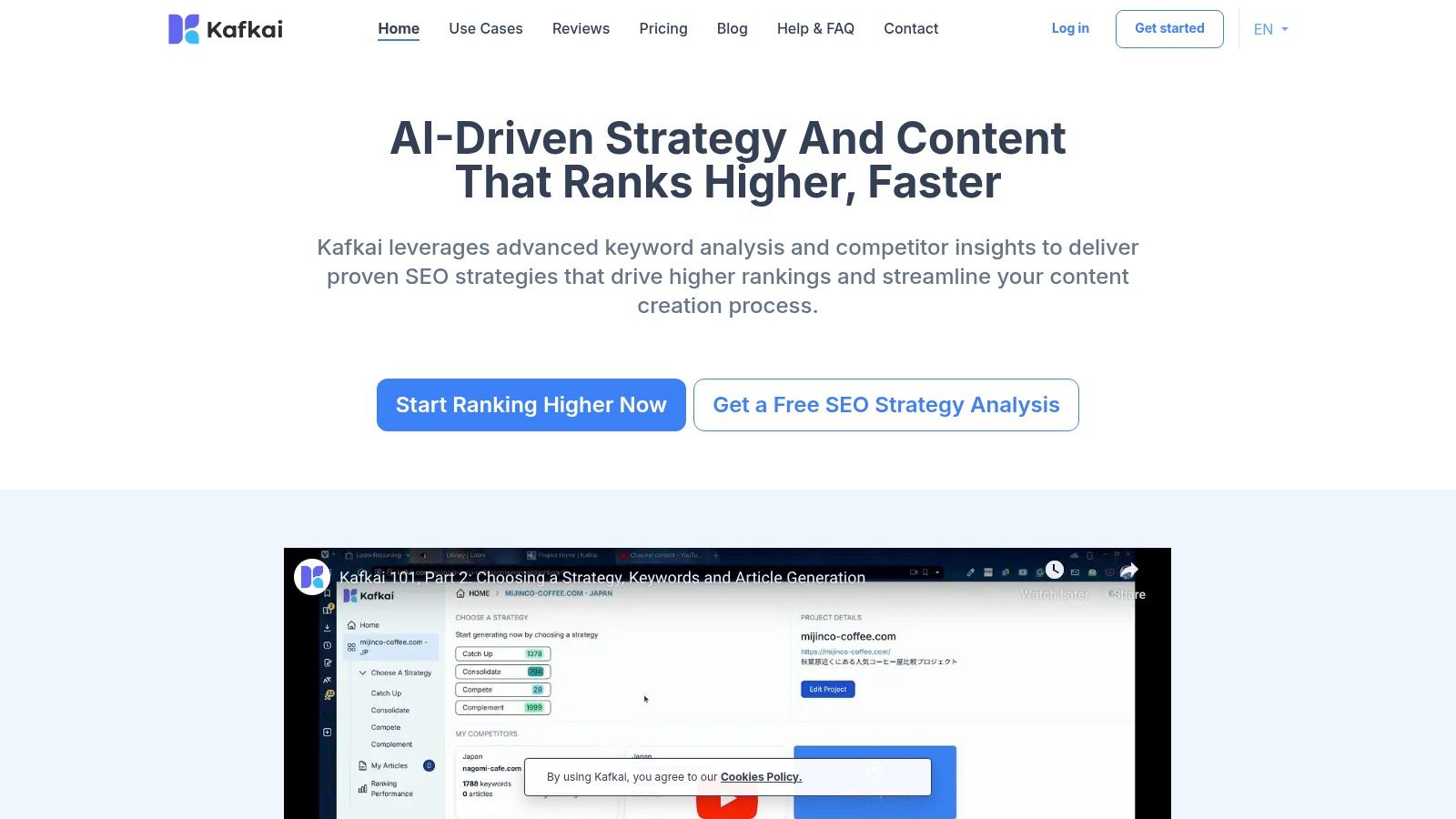
Use Cases and Limitations
- Best For: Content marketers, affiliate bloggers, and SEO specialists who need to produce a high volume of articles in specific niches. It's useful for generating first drafts for "how-to" guides, listicles, and informational blog posts.
- Pros: The niche-specific generation modes can save significant research and writing time. It is highly effective for bulk content creation, and its focus on SEO helps improve online visibility from the start. The interface is clean and user-friendly.
- Cons: The output can sometimes be generic or require heavy manual editing to fix inaccuracies and add a unique voice. It lacks the creative narrative controls found in dedicated fiction writing tools, making it unsuitable for novelists or short story authors.
Pricing: Offers several tiered monthly plans based on the number of articles generated, starting from a "Writer" plan and scaling up to agency-level packages.
Website: kafkai.com
10. Copy.ai: The Quick-Start Idea Generator
While primarily known for marketing and short-form content, Copy.ai serves as a surprisingly effective ai story writer for brainstorming and initial drafting. Its strength is its simplicity and speed, making it an excellent tool for authors who need to quickly generate story seeds, character concepts, or dialogue snippets. The platform's template-driven approach, with over 90 options, includes creative tools perfect for overcoming the initial blank page paralysis.
The "Freestyle" tool is particularly valuable for fiction writers. You can feed it a simple prompt, like "a detective who is afraid of the dark," and it will generate a variety of paragraphs, opening lines, or character descriptions in different styles. The "Tone" adjustment feature also allows you to guide the output, ensuring the generated text aligns with the mood of your story, whether it's mysterious, witty, or dramatic. This makes it a great starting point before moving to a more specialized narrative tool.
Use Cases and Limitations
- Best For: Authors in the early brainstorming phase, writers needing quick inspiration for short scenes or dialogue, and content creators who also manage marketing materials alongside their fiction projects.
- Pros: Extremely fast and user-friendly, making it accessible for beginners. The wide array of templates provides structured creativity, and multi-language support is beneficial for a global user base.
- Cons: Not designed for long-form narrative construction. The output often requires significant editing and expansion to form a cohesive chapter, and it lacks the advanced plot and character development tools of dedicated story writing software. Its capabilities are more aligned with an AI essay writer than a full-fledged novel-writing assistant.
Pricing: Offers a free plan with a 2,000-word limit per month. Pro plan starts at $49/month for unlimited words and more advanced features.
Website: Copy.ai
Top 10 AI Story Writer Tools Comparison
| Product | Core Features / Capabilities | User Experience / Quality ★★★★☆ | Value & Pricing 💰 | Target Audience 👥 | Unique Selling Points ✨ |
|---|---|---|---|---|---|
| 🏆 TextSpell | AI suite: Chat Ask, Humanize, Continue Writing, Homework Helper; 100+ languages; PDF chat; GPT-4 Vision | Highly rated 4.7/5 ★★★★☆; intuitive web/app | Free (500 words); Starter $8/mo; Unlimited $16/mo | Students, marketers, freelancers, businesses | All-in-one with specialized tools + multi-language + advanced AI integrations |
| Sudowrite | Fiction-specific: Story Engine, Draft, Rewrite, Brainstorming | Intuitive, guides creative fiction writing | Premium pricing, higher cost for advanced plans | Fiction writers | Tailored for storytelling with character & plot tools ✨ |
| Jasper AI | Boss Mode, SEO integration, plagiarism checker, 50+ templates | Fast, versatile; quality dependent on prompts | Mid to high tier pricing | Content creators, marketers, fiction writers | SEO-friendly, multi-format support with Surfer SEO |
| NovelAI | Story continuation, character/world building, style adaptation | Secure, customizable editor; needs careful prompt | Subscription-based | Fiction writers | GPT-based long-form storytelling with encryption |
| Writesonic | Article writer, landing page generator, image generator, GPT-4 support | User-friendly; needs editing for uniqueness | Free tier + affordable paid plans | Bloggers, marketers, beginners | GPT-4 + visual content generation ✨ |
| Rytr | 40+ content types, tone adjustment, plagiarism checker | Affordable, easy use; may need edits | Free plan + affordable plans | Diverse content creators | Broad applications with multi-language support |
| KoalaWriter | Outline editor, WP & Google Sheets integration, SEO content | High quality SEO content; minor repetition | Affordable scalable pricing | Long-form writers, bloggers | Direct WP publishing + collaboration tools ✨ |
| GrowthBar | SEO blog writer, keyword research, Chrome extension | Easy navigation; strong SEO features | Mid-tier pricing | SEO marketers, bloggers | SEO + competitor analysis + real-time SEO metrics |
| Kafkai | SEO long-form content, proofreading, unlimited storage | Productive, SEO-focused; some accuracy issues | Subscription plans | Marketers, businesses | Bulk content generation, SEO optimized |
| Copy.ai | 90+ templates, tone adjustment, multi-language support | Fast short-form copy; simple interface | Affordable | Marketers, entrepreneurs, beginners | Large template library; easy start |
Choosing Your AI Story Partner: The Final Verdict
Navigating the landscape of AI story writer tools can feel as complex as plotting a multi-arc novel. We've journeyed through ten distinct platforms, from specialized fiction aids like Sudowrite and NovelAI to versatile content powerhouses like Jasper and Copy.ai. The central truth is clear: there is no single "best" AI story writer for everyone. The ideal choice is deeply personal, tethered directly to your unique goals, workflow, and creative challenges.
Your decision should not be about finding a tool to replace your voice, but one that harmonizes with it. The true power of an AI story writer is its ability to act as a tireless assistant, a brainstorming partner, or a meticulous editor, allowing you to focus on the core elements of storytelling that only a human can provide: emotion, vision, and purpose.
How to Select the Right AI Tool for Your Needs
To make the final call, move beyond feature lists and consider your primary use case. Your selection process should be a strategic one, focusing on solving your biggest bottleneck.
- For the Dedicated Fiction Author: If your world revolves around character arcs, plot twists, and evocative prose, your focus should be narrow. Tools like Sudowrite and NovelAI are built from the ground up for narrative fiction. They offer specialized features for brainstorming, expanding scenes, and maintaining stylistic consistency that general-purpose writers often lack.
- For Marketers and Entrepreneurs: Your storytelling serves a different purpose, driving engagement and sales. An AI story writer like Jasper, Writesonic, or GrowthBar is your best bet. These platforms blend creative writing capabilities with powerful SEO and marketing frameworks, helping you craft compelling brand narratives, blog posts, and ad copy that resonates with both people and search engines.
- For All-Around Content Creators and Students: If your needs are diverse, spanning from academic essays and research summaries to social media updates and creative stories, a versatile tool is essential. A comprehensive platform like TextSpell or Rytr offers a wide array of templates and a balanced feature set, providing robust support without being overly specialized in one area.
Final Considerations Before You Commit
Before you subscribe, take full advantage of free trials. Test the same prompt across your top 2-3 choices to directly compare their output quality, tone, and creativity. Pay close attention to the user interface and overall experience. A powerful tool with a clunky, unintuitive editor can disrupt your creative flow. When evaluating potential AI story partners, considering the user experience and specific editor capabilities, such as those demonstrated by the editor at tnote.ai, is crucial for an effective workflow.
Ultimately, the right AI story writer will feel like a natural extension of your own creative process. It will break through writer's block, accelerate your drafting phase, and empower you to tell bigger, better stories than ever before. The era of the augmented author is here, and with the right partner, your storytelling potential is limitless.
Ready to see how a top-tier AI can transform your writing from start to finish? Explore TextSpell, the all-in-one platform designed to handle everything from intricate story plots to polished, human-like marketing copy. Start your free trial today and unlock your most productive writing yet.

